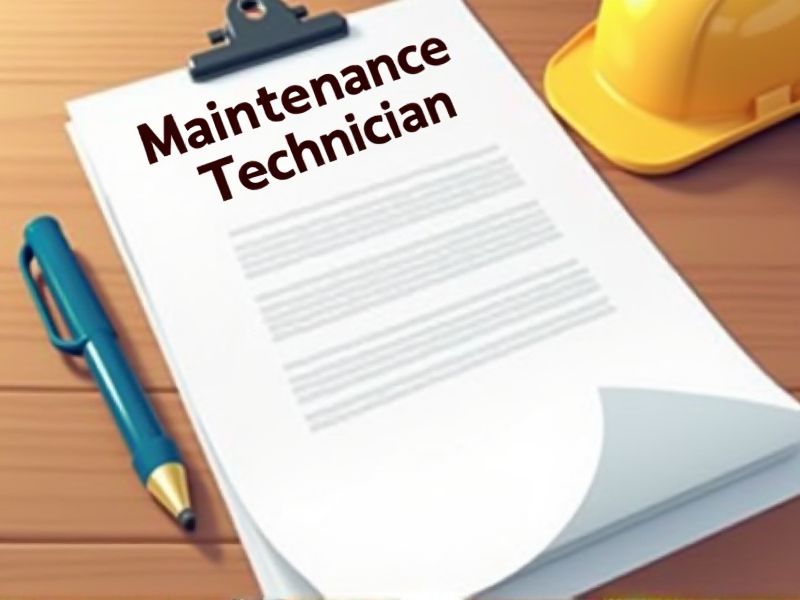
Maintenance Technicians require certain certifications to ensure they possess the necessary skills to maintain and repair equipment safely and efficiently. These certifications validate their knowledge of industry standards, reducing the likelihood of costly downtime and accidents. They also give employers confidence in the technician's ability to handle complex systems and machinery. Here are some important certifications you may need as a Maintenance Technician.
OSHA 10/30 Certification
OSHA 10/30 Certification ensures Maintenance Technicians grasp vital safety practices, reducing workplace accidents. This certification cultivates a culture of safety, directly impacting injury rates and enhancing team efficiency. Employers often comply with regulatory standards, and having certified technicians helps meet these legal obligations. It instills a sense of responsibility and awareness, preparing technicians to handle a variety of hazardous situations adeptly.
EPA 608 Certification
EPA 608 Certification is required for maintenance technicians because it ensures they are trained to handle refrigerants safely, which reduces the risk of environmental harm and complies with federal regulations. Technicians with this certification are better equipped to prevent refrigerant leaks that can deplete the ozone layer. The certification demonstrates a technician's knowledge of proper handling and disposal procedures, minimizing hazardous exposure risks to both the environment and human health. Companies often prefer or require certified technicians to ensure adherence to legal standards and to promote environmentally responsible practices.
NFPA 70E Electrical Safety Certification
Maintenance Technicians work in environments prone to electrical hazards, so having the NFPA 70E Electrical Safety Certification significantly reduces risks of injury from electrical incidents. The certification provides them with crucial knowledge about identifying and mitigating electrical hazards, which enhances workplace safety and compliance with safety regulations. By understanding safe work practices and procedures outlined in NFPA 70E, technicians can minimize downtime caused by accidents or unplanned maintenance. Employers benefit from lower insurance premiums and legal liabilities when their workforce is trained and certified in electrical safety standards.
Certified Maintenance & Reliability Technician (CMRT)
The Certified Maintenance & Reliability Technician (CMRT) credential serves as a benchmark for validating the knowledge and skills of maintenance technicians, which leads to improved operational efficiency. Certification helps in reducing downtime and maintenance costs by ensuring technicians are adept at preventative and predictive maintenance practices. Certified technicians are often more up-to-date with the latest industry standards and technologies, ensuring safer and more reliable facility operations. Holding a CMRT certification can enhance career prospects and job stability for technicians, reflecting their commitment to professionalism and continuous learning.
Industrial Maintenance Certification (IMC)
The Industrial Maintenance Certification (IMC) equips maintenance technicians with the necessary skills and knowledge to address complex machinery issues effectively. Certification often results in more accurate troubleshooting and reduced downtime, which can drive overall productivity improvements. Having an IMC can increase a technician's credibility and enhance job prospects in a competitive labor market, as employers value certified expertise. Many companies acknowledge certified technicians' ability to maintain high safety standards, reducing the likelihood of workplace accidents.
HVAC Excellence Certification
HVAC Excellence Certification validates the skills and knowledge of a maintenance technician, leading to increased credibility in the field. This certification often results in higher employment rates, as employers prefer certified professionals who demonstrate a commitment to their trade. By staying updated with the latest industry standards and practices through certification, technicians improve service efficiency and reduce the likelihood of operational errors. Technicians with this certification also tend to command higher salaries and better job security.
Welding Certification (AWS)
Welding certification from the American Welding Society (AWS) provides validation of a maintenance technician's skill level, ensuring quality and safety in welding practices. Certified technicians are recognized for their proficiency, which reduces error rates and potential equipment failures. Employers tend to favor certified technicians, leading to better job opportunities and potentially higher salaries. Consistent quality in maintenance leads to decreased downtime and prolonged equipment life, benefiting overall operational efficiency.
Forklift Operator Certification
Forklift operator certification is needed for maintenance technicians because it ensures they can safely operate forklifts, reducing the risk of workplace accidents. Certified technicians are more likely to follow industry safety standards, which helps maintain compliance with occupational safety regulations. Proper certification enhances operational efficiency as technicians are better equipped to move heavy materials and machinery without delays. The certification also boosts employer confidence in hiring and managing staff capable of handling equipment responsibly.
PLC Programming Certification
Maintenance technicians often encounter programmable logic controllers (PLCs) in automated systems, requiring specific programming skills for efficient troubleshooting and repair. PLC programming certification provides structured knowledge, enhancing a technician's ability to diagnose and adjust control systems accurately. Employers prioritize technicians with certifications because they demonstrate a verified level of expertise in handling complex automation devices. Certified technicians may also experience increased job security and potentially higher salaries due to their specialized skills.
Six Sigma Yellow Belt Certification
Acquiring a Six Sigma Yellow Belt Certification equips a Maintenance Technician with the ability to identify inefficiencies in maintenance processes, resulting in cost savings and improved equipment uptime. This certification provides foundational knowledge in problem-solving techniques, allowing technicians to effectively contribute to quality improvement initiatives. With enhanced skills in data analysis, a technician becomes more adept at predicting potential equipment failures, leading to proactive maintenance strategies. Broadening their expertise through this certification can lead to career advancement opportunities and a competitive edge in the job market.
Summary
By obtaining certifications, you enhance your qualifications as a Maintenance Technician, leading to increased job opportunities. Employers often recognize certifications as indicators of expertise and commitment, resulting in higher chances of career progression. Such credentials can also translate to increased earning potential, as certified technicians typically receive higher pay scales. This professional development contributes to improved job performance and industry reputation, elevating your standing among peers and within the organization.
